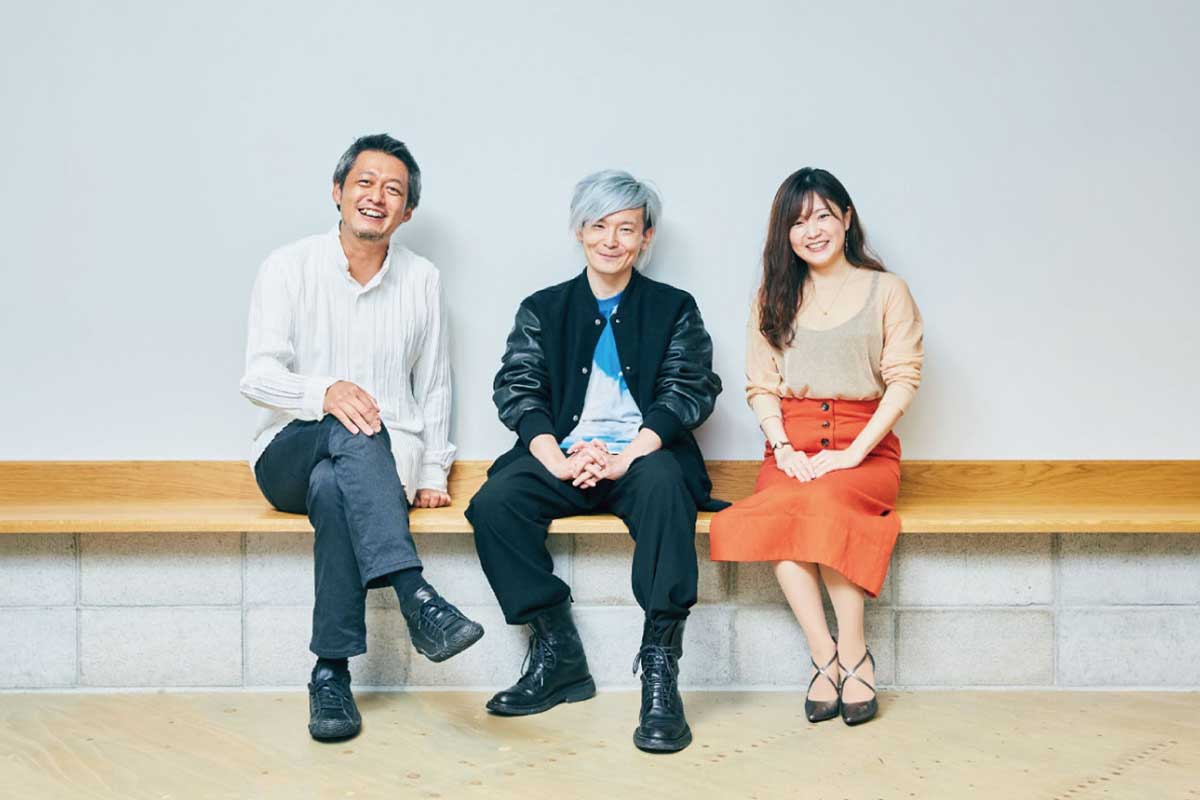- Viewpoints
Professor Hiroaki Miyata + Hakuhodo’s MIRAI Business Division
As more people reexamine the way they work and live amidst the pandemic, the concept of well-being is drawing increasing attention. Hakuhodo’s MIRAI Business Division, a unit dedicated to developing new businesses, has named well-being as one of its focus areas, and aims to create new lifestyles for the future through the creation of new businesses. In this article, Ken Donoue and Natsuki Kitamura of the MIRAI Business Division discuss how to realize a future of well-being for sei-katsu-sha—a term Hakuhodo uses to denote people with lives, aspirations and dreams, not simply “consumers”—with Professor Hiroaki Miyata of Keio University School of Medicine, who aims to bring about well-being in society through digital transformation (DX) and data science.
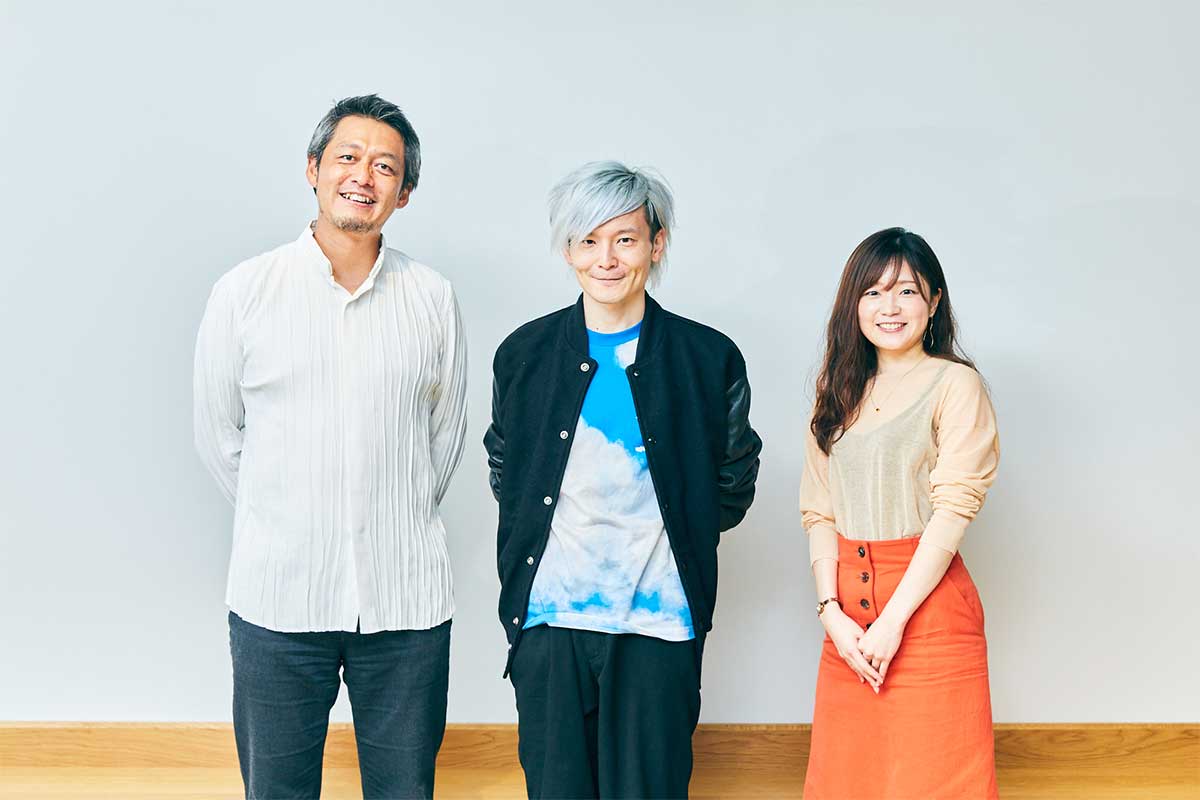
What is well-being? The key word is: “New richness”
DONOUE (MIRAI BUSINESS DIVISION)
I deal with the topic of well-being at Hakuhodo’s MIRAI Business Division, the Hakuhodo unit that develops new businesses. “Well-being” is a broad concept that we define in terms of “a state of happiness in sei-katsu-sha*,” rather than talking about healthcare. My challenge is to create businesses that bring about this state of happiness in sei-katsu-sha—whether that’s that they don’t get sick, or that they have a smile on their faces more often.
Professor Miyata joined the MIRAI Business Division from this year as a fellow and has been giving us advice on our business. Speaking with him sparks all kinds of ideas. His and our ideas about well-being have become a shared asset, and I’d be delighted if they changed the world around us and led to the creation of values for new sei-katsu-sha happiness.

PROFESSOR HIROAKI MIYATA
My field of specialization is “using science to better the world.” I’m actually not particularly stuck on the methods I use toward this, but data has become exceedingly important to this effort in this last decade. I use scientific data and statistics for the betterment of society. Within this context, I think that “new richness” will become a keyword in changing tomorrow’s world.
I work at a medical school, and medicine has already been clearly quantified as something that people place importance on as non-monetary richness. I thought I would start there, and that led me here.
“Richness” in the past meant ownership of property. But the times changed and, noting that wealth cannot be measured in such terms, economists such as Amartya Sen and Joseph Stiglitz started to talk about well-being. Their point was that everyone can live richly, and this is the next richness, after ownership of property.
But now the actions of each of us impact on the world, and even if one person is in a happy frame of mind, it does not last. I call a continuous state of mutual well-being as we interact with society “better co-being.” What do we need to consider? This, I think is the important thing to ensure that every person feels a variety of richness in their interactions with society.
KITAMURA (MIRAI BUSINESS DIVISION)
I joined the MIRAI Business Division’s well-being team partly due to my interest in personal health records (PHR). I, too, was originally in the medical industry, and think that as online medical examinations and treatment spread going forward, the importance of coordinating medical information will only increase.
Previously, my only thought about “well-being” was that it was perhaps another way of saying “happiness.” But after talking with Miyata-san and Donoue-san on many occasions, I began to understand that well-being is not just about the self, but contains the concept of “others.” Since the pandemic, we hear words like “community,” “empathy” and “connections” more than ever, and when you think about why people want to connect with someone else, it’s because they want to look to the future or to create the future with someone. This feeling is inherent in human beings. The futures we envision with others excite us. I now think that this state is what well-being is about.
In the digital revolution, sei-katsu-sha’s values are key
DONOUE
The subject of data has come up quickly. A while back, when senior management of various companies got together to discuss how their companies should advance DX, the conversation also turned to the handling of data, including in the medical domain.
MIYATA
The most important aspect of the digital revolution is sei-katsu-sha’s values. First and foremost, we need to know what kind of society sei-katsu-sha want to realize, and then redesign from there. Consumption and economies will emerge as we propose an array of styles that bring sei-katsu-sha’s values to life. Key here, too, will be a diversity of richness. Harmonizing with all kinds of people to create new values together is essential to better co-being, and this takes creativity.
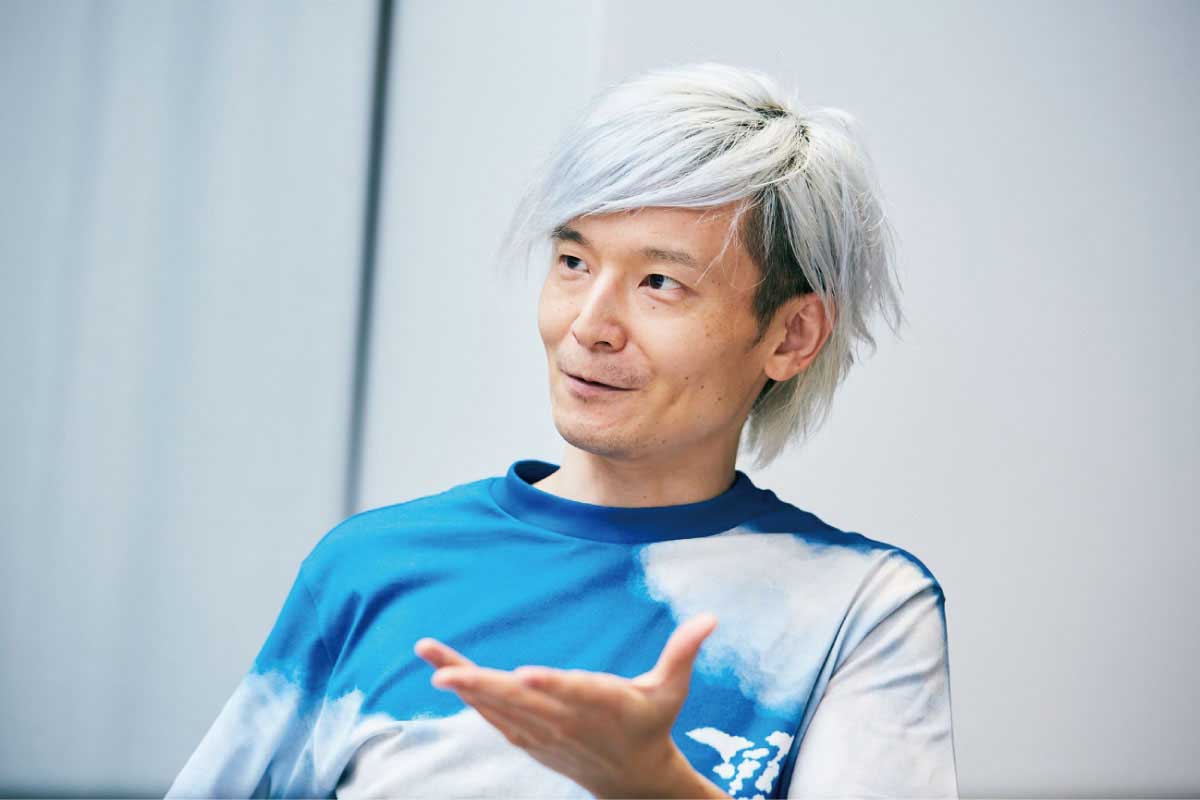 Professor Hiroaki Miyata, Keio University School of Medicine
Professor Hiroaki Miyata, Keio University School of MedicineDONOUE
Demonstrating creativity rooted in sei-katsu-sha’s values is also at the heart of Hakuhodo’s doctrine.
MIYATA
When I thought about what the “mirai” (future) in MIRAI Business Division means, I pondered that while what constitutes richness may differ from person to person, when we lift our eyes, every one of us sees the same sky. And that, I thought, is my image of the future. It’s okay that each of us has a different purpose in life, and the best tool to somehow bring the world together, I thought, is looking at the sky. I chose my t-shirt today with this image in mind. [Laughs]
DONOUE
That’s great. To my mind, the basic condition of well-being is to “Live and think positive,” and that is my image of the positive feeling you get from looking at the sky. I think about the frameworks that might be required to create a society in which everyone can reach this state.
Society beginning to operate using value other than money
MIYATA
Going forward, we need to consider the form of the society at the other end of capitalism as we’ve known it until now. This leads directly to Society 5.0, Industry 4.0, and to what the World Economic Forum calls “The Great Reset.” Frameworks for running the economy with things other than money are already appearing. For instance, China’s social credit scores are being shared neutrally and objectively as data, and in one sense are starting to have a value beyond money. The gateway to a society driven not just by money but by a multitude of values is becoming visible on a national level.
The mainstream of the economy is also beginning to change. Until just recently, companies’ CSR and ESG investments were often merely for form’s sake: with one hand they were making money and with the other they were squaring that up by making donations. Conversely, these days companies also need trust in order to get access to sei-katsu-sha data, and if they are not able to say “we’re using your data for good,” such as in Data for Good and AI for Social Good, then they will no longer be able to use it. Companies are now being scrutinized for how they contribute to good through their business, or to put it another way, how they contribute to well-being. I believe that we are entering an era where we will work out how to resonate with each other to create a society that contributes to diverse richness.
DONOUE
It’s the same with the PHR I just mentioned. People tend to think of PHR as being digital medical charts, but going one step further, I also think that such things as how much someone has laughed and how much they have spoken to others are, in a broader sense, personal health records. It has been posited that such things as how much we have connected to society and the degree to which we have encountered new things are also key to the well-being of human beings. I would like to utilize such data to create frameworks that would allow sei-katsu-sha to naturally reach a state of well-being, like for some reason not catching cold since they came to this city, or finding themselves smiling more. I’d like to create well-being cities, where the entire city contributes to well-being.
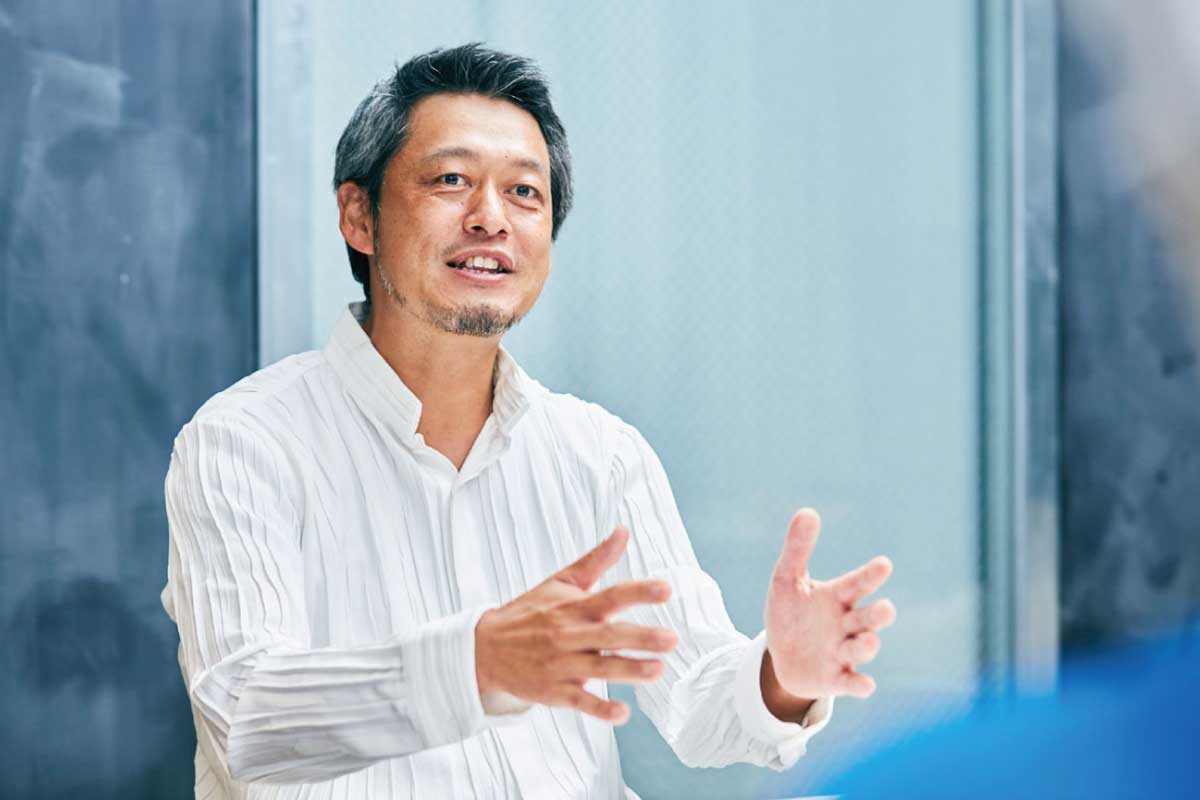 Ken Donoue, MIRAI Business Division
Ken Donoue, MIRAI Business DivisionMIYATA
Well-being cities. I like that! Smart cities are not about making cities smart for the benefit of companies or creating cities where you can move around with the greatest efficiency. The important thing is the happiness of the people who live there. We’re talking about cities that make you feel you’re able to smile this much because you live here.
KITAMURA
How we create cities will also change going forward. It will no longer be a matter of creating the hardware and leaving it at that. I think that people will look for cities that can change flexibly to ensure the happiness of the people who spend time there, cities where each person can feel their own version of richness.
MIYATA
The main thing is that technologies that match individual preferences have come down in price and are now feasible. Individualized services, which until now have been nothing more than an idealistic notion, are now possible. Already, streaming services that recommend content based on individual preferences are proliferating in the music and video domains, increasing satisfaction significantly without increasing the cost. You might think, “I like that song,” and watching it, find out that it’s an international artist’s debut song. You would never come across this music previously without going round live venues abroad.
Urban planning until now involved assuming the average and lifting the whole up, so lots of things had to be disregarded. But with the emergence of technology able to conform to the individual, I think we now have new choices about how we live.
The right to choose our lives is restored, thanks to the pandemic
DONOUE
I think that things we were forced to change as a result of the pandemic, such as the ways we work and spend time with our families, spurred all of us to rethink what living is. That includes me, myself. It is the first time I’ve experienced sharing three meals a day with my family since starting my career, and I now take a power nap at lunchtime and find that my work in the afternoon goes much smoother. Changing how we use our time, where we work and the people we meet brings us in contact with new people and experiences, and changes our habits. This showed me that these ways of living also exist.
Recently I never get sick, perhaps because I now wash my hands so much. I think unknowingly this habit has created a state of well-being. Recently, I’ve been thinking that if each of us makes changes conscious of how we would like to be, we would probably be able to create a state of well-being by ourselves.
MIYATA
Our right to choose our lives has reverted to us, hasn’t it? Where previously it was thought that during work hours we had to give everything to the company and spend our time rigidly, we know now, actually, that the work will still get done even if we don’t do that. The pandemic has made us aware of our unappealing normal and given us the opportunity to think about what constitutes well-being.
KITAMURA
It’s critical for each of us to have intention if we are to make choices. I think it’s really important to not entrust our happiness to other people. We need to be able to think, “This could be what happiness looks like to me,” in our everyday lives, and to be able judge whether futures or new perceptions suggested by others make us happy.
To ensure this, I think it would be great if we could create a world with different forms of happiness sprinkled all around. Convenience is right in a sense, but of itself it does not engender happiness; we need to think beyond it. How can this service make people happy? Wouldn’t it be lovely to increase people’s sensitivity to happiness by sprinkling a lot of well-designed services around, creating opportunities to encounter various kinds of happiness.
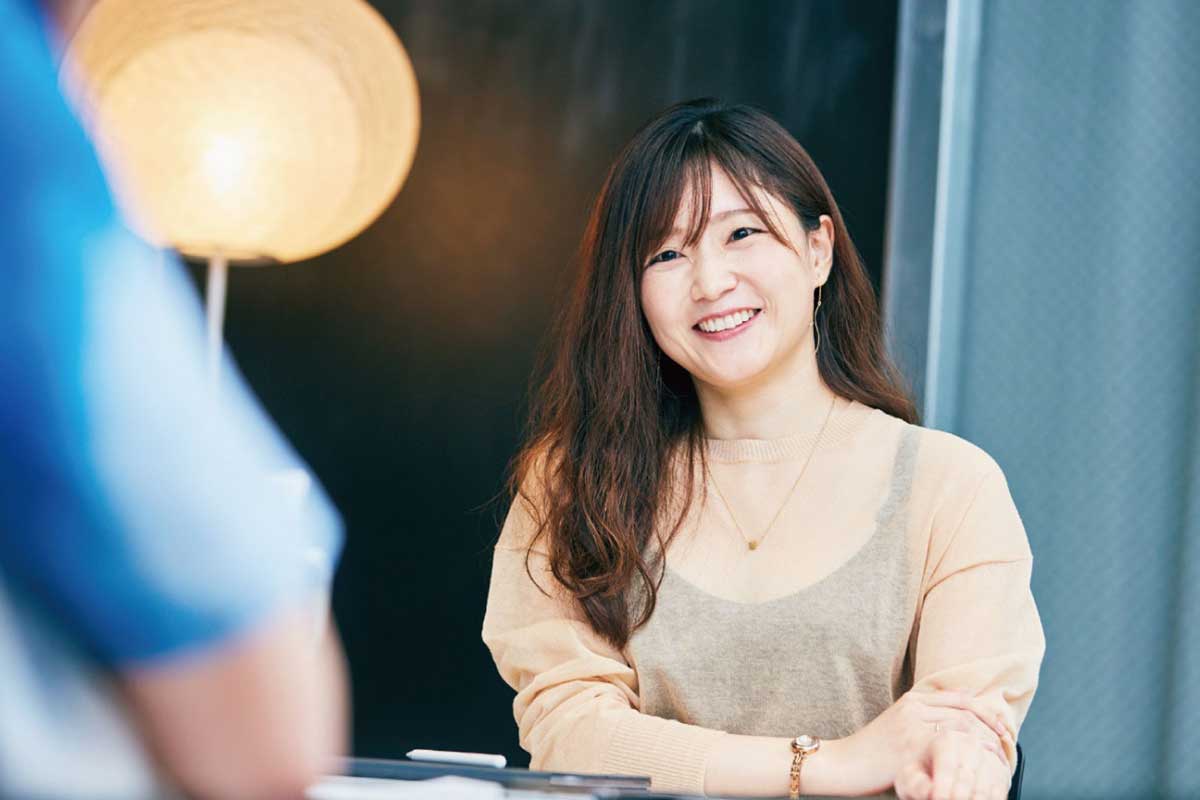 Natsuki Kitamura, MIRAI Business Division
Natsuki Kitamura, MIRAI Business DivisionMIYATA
At the World Exposition [Miyata is a Thematic Project Producer for Expo 2025 Osaka, Kansai], too, we are looking to create the experience of changing the world by ourselves by resonating the strengths of the many together. I feel that if we can visualize a future that we can personally contribute to, it can give us a bit more courage and nudge us forward.
Food, clothing and housing for well-being
DONOUE
Really, the foundation on which to think about well-being is the basics of food, clothing and housing. Food, in particular, is the source of our lives. I focus on data on food, because data such as the kinds of nutrients that may be lacking can also be used to prevent the risk of illness. Also, I’d like to create opportunities for extending life expectancy by sharing Japan’s food culture with the world.
MIYATA
After all, in terms of flavor, Japanese food is ranked up there around the world. Without a doubt, this is a domain that we are competitive in internationally.
DONOUE
The MIRAI Business Division participates in the open innovation program Food Tech Studio – Bites! as a business partner. The program creates new food industries together with companies that are passionate about sparking a revolution using food tech. I’d like to become a life changer that changes the world by realizing well-being through food.
MIYATA
“Life changer” is such a nice term. In terms of food, clothing and housing, I have some thoughts about fashion. Unfortunately, uniforms and suits have recently been used as dress codes for stripping people of their individuality. When you put that alongside Society 5.0 and other government visions for the future, it is way off base. We have a culture that espouses leveraging individuality while it continues to deprive people of that very individuality. Dress codes are necessary to some extent, but in future, I think it would be better to give advice about how to express one’s individuality within them. I guess that this will also lead to the “cultivation of intention” that Kitamura-san spoke of. Rather than excising that which is different, I think it’s essential that we recognize different personalities. Naturally there will be those who are happy with “normal” attire, but we also can’t deny that this is the result of them being continuously stripped of their individuality.
DONOUE
It’s absolutely essential that each of us is intentional about how we want to be, including regarding our food and clothing. There also seem to be things that need to be changed in the education sphere. I believe that everything—education, smart cities, commerce, you name it—is connected to well-being.
MIYATA
That’s true. It’s all linked. You could call this a phase in which we join arms and knock down all the barriers together.
When I first mentioned the concept of well-being in mainstream medicine, I got a lot of “Huh? What’s that?” type comments from my peers. But the concept was important.
This, too, is the well-being that Kitamura-san spoke of at the beginning and what I call better co-being. Rather than one person being well, the most important thing is that we all shine together.
A world where we can all be creators
DONOUE
Finally, could I ask each of you to speak briefly about what you are looking to do together. For my part, as was mentioned earlier about the sky, I’d like to increase the number of people who can look up at the sky and think positively. With Miyata-san, I’d like to create frameworks that can propel people forward toward building an exciting society.
MIYATA
When I think about who is a creator, I feel that until now there has been an invisible line between creators and others. But in the coming world where we all come together, all kinds of people will become creators and together we’ll create new richness. This, I think, will also lead to ways of living in which each person has their own intentions. I think that this will be a time for everyone at Hakuhodo, who have long worked in creativity, to shine.
KITAMURA
Previously, Miyata-san said, “Data will be a means of saving those in weak positions or that need help.” Right now, I feel like we have everything in place to do that. By linking data and technology, I would like to discover what a society that is better for all of us and that leaves none of us behind looks like.
